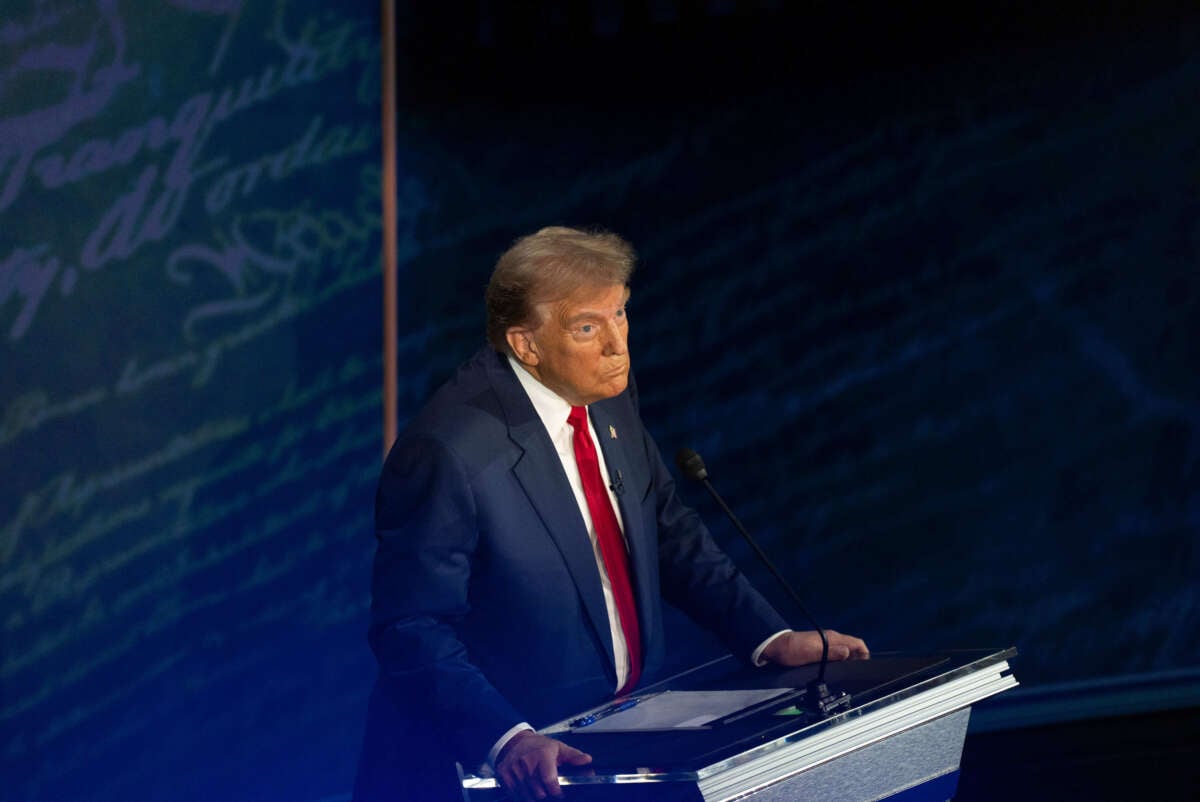Republican candidate for president Donald Trump suggested on Wednesday morning that ABC News, which hosted the debate between him and Democratic candidate Kamala Harris the night before, should be punished for how it handled the event, alleging that the network engaged in biased attacks against him.
In reality, Trump had a dismal debate performance, peddling numerous outlandish lies, failing to focus on questions posed to him, and engaging in several meandering rants that likely baffled viewers at home.
In a rarity, moderators David Muir and Linsey Davis fact-checked Trump’s most preposterous statements in real-time, interrupting the debate to tell him that his claims of immigrants stealing and eating pets in an Ohio community were baseless and that no state in the country performed any type of post-birth abortion, as he had wrongly (and repeatedly) alleged.
Muir and Davis received positive reviews for how they handled those situations and the debate overall. Still, Trump demanded that the network be punished for essentially addressing how poorly he did against Harris.
“They’re a news organization. They have to be licensed to do it. They ought to take away their license for the way they did that,” Trump said in an interview with Fox News on Wednesday.
Trump added that he believed the debate was a “rigged deal,” and complained that the factcheckers “correct[ed] everything” he said (they did not) while “not correcting” Harris on any topic.
While Harris received fact-checks after the debate, her comments were not as outlandish as Trump’s, and thus did not require the same kind of fact-checks that Trump received from moderators.
“The press is so dishonest in this country, it’s amazing,” Trump whined.
In a Truth Social post later on Wednesday, Trump called for Muir and Davis — and indeed, everyone working at the network — to be terminated. “They should fire everybody at ABC Fake News, whose two lightweight ‘anchors’ have brought disgrace onto the company,” Trump wrote.
Television networks like ABC News are not regulated with “licenses” by the Federal Communications Commission (FCC) as Trump implies, although their affiliated local stations are. Still, ABC News did not do anything illegal or in violation of FCC standards, further undermining Trump’s demands that they should be punished in some way for their moderators’ actions.
The questions Muir and Davis asked were but a small portion of the actual debate, taking up just a few sentences and responses from Trump during the 90-minute event. Polling and focus groups after the debate indicated that most watching the debate felt Trump had lost and that Harris had won, as the GOP candidate seemed unfocused and egotistical throughout the ordeal. Harris, by contrast, took on a more professional tone.
Trump has similarly attacked the press in the past, and his demands for punishment against networks and news agencies who report on him negatively or otherwise show him in an unappealing light are not unusual. He made similar demands against cable news stations and network channels earlier this year, complaining that, after he had won the Iowa caucuses in January, there was not enough coverage of his victory speech — again demanding that those stations’ non-existent licenses be revoked.
Trump’s attacks on the media, including his calls to censor their legitimate reporting on his statements, showcase his authoritarian leanings and suggest that he would impose undue restrictions on the free press should he get back into the White House, much like he did when he was president before. In 2018, for example, his administration suspended the press credentials of CNN correspondent Jim Acosta, an apparent retaliation against the journalist for asking challenging questions to then-President Trump over his draconian immigration policies. (Acosta’s credentials were eventually restored after the network threatened a lawsuit against Trump.)
Trump has also sought to enrage his followers by deriding the press as “enemies” of the United States, which has led to threats and even direct attacks against the media by his followers. Though he started doing so in the middle of his administration, Trump continues to make such statements at his rallies to this day, and at a recent Trump campaign event, when it appeared to him that one of his followers was about to attack the press, Trump dismissed the potentially violent action, telling his supporters that the person was “on our side.”
Media that fights fascism
Truthout is funded almost entirely by readers — that’s why we can speak truth to power and cut against the mainstream narrative. But independent journalists at Truthout face mounting political repression under Trump.
We rely on your support to survive McCarthyist censorship. Please make a tax-deductible one-time or monthly donation.
